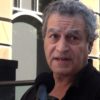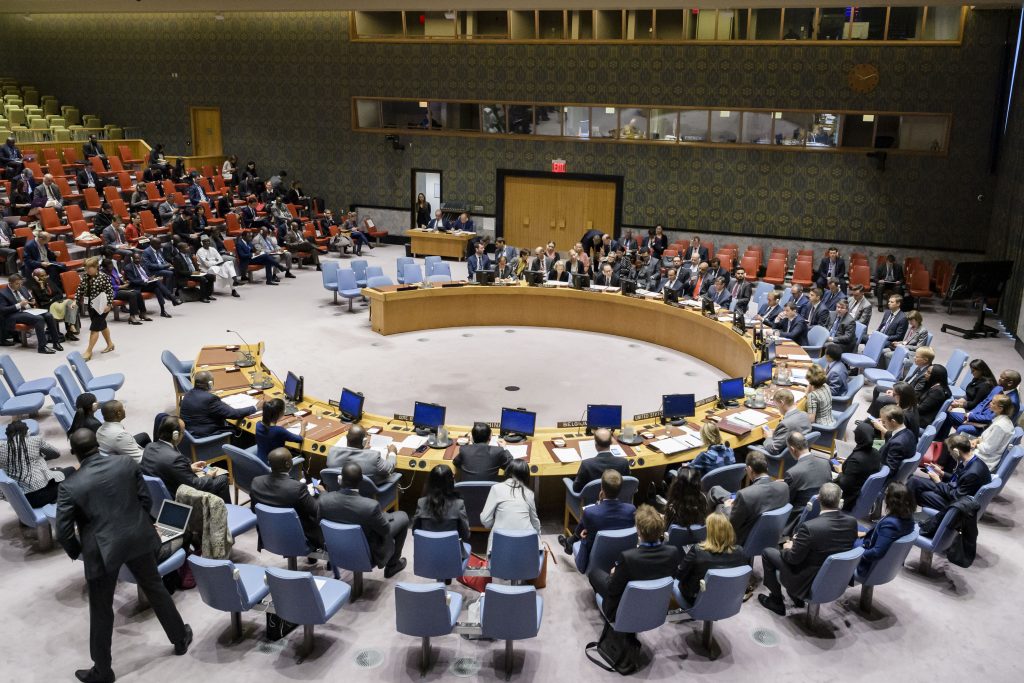UN envoy expects a formal agreement soon that will lead to the end of the brutal Saudi assault on Yemen, reports Joe Lauria.
By Joe Lauria
Special to Consortium News
 The UN envoy to Yemen has told the UN Security Council that he expects the Saudi-led coalition and the Houthis to agree “in the immediate future” on a package of proposals intended to end the five-year old war in Yemen.
The UN envoy to Yemen has told the UN Security Council that he expects the Saudi-led coalition and the Houthis to agree “in the immediate future” on a package of proposals intended to end the five-year old war in Yemen.
Martin Griffiths told the council on Thursday that he has been in “constant negotiations” with the parties over the past two weeks on his proposals. These include a nation-wide ceasefire agreement, humanitarian and economic measures and an urgent resumption of talks for a political settlement.
Griffiths told the council in a virtual meeting:
“I can report that we are making very good progress. We are moving towards a consensus over the proposals, particularly on the principle of a nation-wide ceasefire. And we are redoubling our efforts to bridge the outstanding differences between the parties, before we convene them at a meeting where, because it will be virtual, agreements will be tabled, confirmed and published.”
Griffiths said the humanitarian measures include the “releases of prisoners and detainees; opening Sana’a International Airport; paying civil servant salaries; opening access roads; and ensuring the entry of ships carrying essential commodities into Hudaydah ports.”

Martin Griffiths, Special Envoy of the Secretary-General for Yemen at the Security Council exactly two years ago on April 17, 2018. (UN Photo)
The latter would mean lifting the Saudi blockade, a move that would demonstrate that Riyadh is serious about its unilateral ceasefire declared on April 8.
The Saudi move was spurred by a fear of the pandemic, which had already sickened 150 members of the Saudi royal family, numbered at around 15,000. The governor of Riyadh was among those stricken.
There were no cases of Covid-19 in Yemen when the Saudis announced its unilateral cease-fire and its intention to end the war. Since then there has been one reported infection in the country, which remains unresolved.
“There cannot be a more timely moment for the two parties to commit to silencing the guns and ending the conflict through a peaceful, political solution,” Griffiths said. “Yemen cannot face two fronts at the same time: a war and a pandemic. The new battle that Yemen faces in confronting the virus will be all-consuming. We can do no less than stop this war and turn all our attention to this new threat.”
Griffiths Praises Parties
Griffiths said he was “grateful to both parties for the way in which they have conducted their negotiations with the United Nations, open, constructive and focused.” He singled out the Houthi leader for his intentions to bring the hostilities to a close. “In my discussions with Mr. Abdel-Malik al-Houthi he has always communicated his desire to end this war,” he said.
The UN envoy said a “diplomatic consensus” to end the war is “playing a crucial and indeed central role in pushing all of us and both parties towards what we hope will be a successful conclusion in the near term.” Crucially, the United States is backing the cease-fire as well as peace negotiations.
Griffiths said despite the tangible progress, fighting continued. But he did not think it would derail the negotiations, as many skeptics say.
“Lamentably, military activities continue on a number of fronts despite many calls from Yemenis and the international community and this council for it to stop,” he said. “I fear it will continue until we get an agreement on our proposals, including a nationwide ceasefire.”
Joe Lauria is editor-in-chief of Consortium News and a former correspondent for The Wall Street Journal, Boston Globe, Sunday Times of London and numerous other newspapers. He can be reached at joelauria@consortiumnews.com and followed on Twitter @unjoe .
Please Donate to Consortium News


Perhaps the UN will arbitrate between KSA and Iran, between Sunni and Shiah, to show them their common ground.
When they are united against Israel, the UN can negotiate there, and we shall see the real aggressors in the Mideast.
If the US had any legitimate foreign causes or diplomatic capacity, the UN could arbitrate with its victims of choice.
No doubt that requires its general defeat, when it will hide behind propaganda rather than negotiate anything.
Noah, your post is very interesting and one of the best descriptions of the IMF trap I have read. Stiglitz described it well. Ditto your discussion of Islamic banking. Hundreds of years ago it was western banking and usury was a bad word. Mixed feelings about interest, certainly it serves a purpose and yet can be abused.
I absolutely agree with Norah
Good news maybe despite what the nay-sayers will always say. I mean if it is always bad news no matter what you read, then you are out of balance. The good and bad have to balance each other off……and given all the bad news of late maybe it is time for some good news.
What do you think?
Moreover, I think the vulnerability of bases being occupied has been exposed. This occurred after the recent assassination by drone followed by a murderous downing of a plane if my sources are correct. On speculation, I also have good reason to believe that the downing of the plane was from another source, but of course speculation ain’t worth much.
Ken
So who wants peace in the region, i.e., peace with justice. Clearly, we do not if it means conferring some advantage for Iran in the region. Ditto, Israel that achieving justice for those it oppresses is too high a price for peace. Even Russia, while intervening in a positive way in Syria has its own agenda, not the people’s of the region. In the interests of both the Sunnis and the Shiites, it is best that they come to some understanding, realizing those other than the two religions, have no interest in their welfare, but in keeping each at the others throat.
Everyone understands the schism is as old as Islam, still it is something to aspire to and wished for just as the reconciliation between Palestinians and Jews. Both seem unthinkable but both are imaginable and possible.
In this regard, perhaps being enticed by conspiracy theory, Soleimani was killed as some reported he was on his way to Riyadh. Did his death have anything to do with his plans?
Although my studies there are limited by time, it appears that the old schism between Sunni and Shiah is somewhat like that between Catholicism and Protestantism, readily bridged by the thoughtful, but not by under-educated tribalists led by opportunist tyrants. Both Iran and KSA have substantial well-educated groups, but they may still fear the tyrants of their tribes. Reconciliation may be easier after two or three generations of broader education, perhaps accelerated by the more enlightened among them.
It would appear that the sole reason for the Saudis willingness to end the war is the fact that the cannot win, and indeed, stand every chance of losing. The are not being reasonable they have just simply been forced into realism. All the wasted monies on high-tec weapons systems which failed the test could not defeat the lightly armed Houthis. We have only to surmise that this lesson will be learnt by other anti-US forces in the area and will bolster their resolve to resist the US and its proxies.
Sort of, but in reality both sides were incapable of winning. But don’t think for one second that had the Houthis taken the whole of Yemen, it would have been the end of it. No way. Saudi Arabia is in the Western Banking System, the Houthis prefer Islamic banking, i.e. no debt, no compound interest, no usury. A loan from a bank generates no interest, only an initial very low service charge. So a slight disappointment for the Rothschild Cartel. Also no US base would be permitted in Yemen. Another red line for the Empire. The Houthis were never going to win, a draw was the only option the Empire would permit, with conditions. They would be lent plenty of money to rebuild and oh dear , all of a sudden they have to pay back the loans with interest, and you can be assured that after a while the debt would spiral out of control, leaving them like Greece, Puerto Rico and others, in debt bondage until the end of time, or the end of their country. The IMF, the World Bank and their buddies will be straight in there the very next day after the ceasefire. The US would find an excuse for a military base, they never fail to. Only a small base ( to start with ) just a couple of hundred marines plus an airport.
The COVID-19 arriving on so many Saudi Royals apparently spooked them. God’s will??? The US/UK/French weapons will perhaps stop flowing and the remaining Yemenis may manage to survive-let us hope so. If the UN suggestion of a ceasefire of all wars could penetrate the braincells of US leaders and they could realize that this virus cannot be defeated by blaming others and using more violence, a whole new attitude may develop. One can always hope.
Another reason is that they experienced some shortage of revenue even before the latest collapse of oil prices. If they had an idea to compensate for a part of the loss by ramping up the volume, they quickly got disabused — there is a big and inflexible drop in demand, production that is in excess of that has to be stored, prices of available storage are skyrocketing. KSA has reserve funds, but those that were invested in stocks dropped too… In other words, the Kingdom has to explore all easy ways to cut spending.